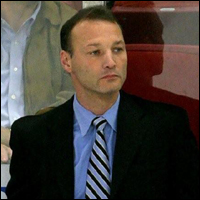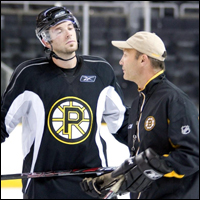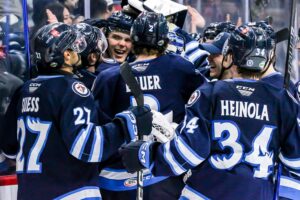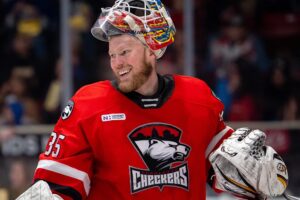by Adam Kaufman || AHL On The Beat Archive
 “I always looked at Scott (Gordon) and Rob (Murray) as a tandem last year,” recounted Boston Bruins general manager Peter Chiarelli.
“I always looked at Scott (Gordon) and Rob (Murray) as a tandem last year,” recounted Boston Bruins general manager Peter Chiarelli.
So when the Providence Bruins head coaching job became a vacant one on Aug. 13, 2008, as a result of Gordon’s promotion to the National Hockey League, there were certainly a slew of options among those capable of taking over the lead duties, but there was also one choice that made the most sense.
“There was an obvious familiarity there,” Chiarelli continued of Murray, who had previously served as Gordon’s assistant for five seasons. “But as we went through the stages of the interview process, discussing players and looking back at the last season, Rob’s emotion really stood out.”
“Murr is one of those coaches that a guy wants to play for,” said P-Bruins captain Jeremy Reich. “That’s all a player can ask for. He did well as an assistant coach here for years under Gordo and I think he matured over those years as well.”
As far as Murray is concerned, it’s that maturity that helped him transition almost seamlessly in a job that otherwise could have presented an overwhelming amount of pressure.
“Your natural progression in any walk of life is that you want to keep either getting promoted or moving up in some manner,” said Murray very matter-of-factly. “In my case, the natural progression is obviously to move from player to assistant coach to head coach. Some guys skip a step here or there but I would like to think as far as my education goes as a coach, that is the proper way to go about it.”
That education began long before his interview process for the Providence head coaching position or, for that matter, its assistant opening in 2003. Murray played the game professionally for 16 years, taking shifts in more than 1,200 contests and better than 1,000 at the American Hockey League level, half of those with the Springfield Falcons.
And his days in uniform, which ended with more than 500 points and 3,000 penalty minutes, were highlighted by his role as a vocal leader off the ice as much as his often physical demeanor on the sheet. Murray captained four different teams in the AHL, laying the ground work for a very logical move into coaching.
“To be quite honest, I had my sights set on trying to get into coaching long before I ever retired,” recalled Murray. “As a captain and being a leader on teams, I always tried to study the game probably more than other players did. You hear over and over again from players in hockey or any sport that it’s the only thing they know.
 “There’s a lot of truth to that, I think. You can branch out into other things but if there’s something you feel you know better than anything else, why not try to continue being successful? I knew I had to retire someday, everybody does. But I wanted to continue in the game and coaching seemed to be the logical step.”
“There’s a lot of truth to that, I think. You can branch out into other things but if there’s something you feel you know better than anything else, why not try to continue being successful? I knew I had to retire someday, everybody does. But I wanted to continue in the game and coaching seemed to be the logical step.”
“He’s definitely a student of the game,” said Gordon, his direct predecessor now with the New York Islanders. “He wants to get better at it and as a result he will because he has a passion for it. I think the biggest thing is that he’s been in Providence for five years and a blueprint has been put in place for all the new players who come in.”
“Guys are prepared under Rob,” agreed new P-Bruins assistant Bruce Cassidy, named to his position nearly three weeks after Murray’s Aug. 21, 2008, promotion. “There is no gray area in terms of how we are going to play in every area of the ice. Add to that his intensity on the bench, I think the players feed off of that.”
“His assets from a hockey perspective are face-offs, penalty killing, defensive play and playing with an edge,” further detailed Gordon. “I think that’s a message that he does a really good job of presenting to the players. There’s something to be said about the way Murr played the game and how he represents the game as a player and a coach, having a guy there that played the game the right way and there weren’t any shortcuts. I’m sure that’s the same respect that will be passed down to the players.”
Chiarelli echoed Gordon’s statements on Murray as a former player, stating that his emotion, but also a controlled emotion, helps him to work with players one-on-one and run a good practice. One of his strengths and one that varies from coach to coach is that Murray is quick to react rather than necessarily waiting for all of the information to come in.
That fact, meshed with his views on players and coaching philosophies aided Murray in his interview. He focused on hard work, preparation, relentless pursuit of the puck, taking away time and space and running a similar defensive system to Boston’s in hopes of players being able to jump in with the parent club and contribute immediately.
There is a certain selflessness there that allows Murray to so genuinely state his individual goals as a first-time head coach.
“My individual goals are team-oriented,” he said. “I have no aspirations to move up anytime soon and if that ever happens, it will take care of itself. Right now, this is my team. I’m committed to the Providence Bruins and committed to the guys in the room. I want to see them do as well as they can, get the opportunity to go to the NHL and never come back. Obviously I want to win and I’d love to win a championship, I never have as a player or coach. But I’m selfish in the sense that I want my players to develop and do well so they can move on, not me.”
Four months into his first season, Murray has seen several of his players, including Vladimir Sobotka, Matt Lashoff, Martin St. Pierre, Matt Hunwick, Johnny Boychuk, Martins Karsums, Byron Bitz and Tuukka Rask, get the call to Boston after stellar performances at the AHL level.
But Murray still has his Bruins in first place in the Atlantic Division, picking up right where Scott Gordon left off.





































